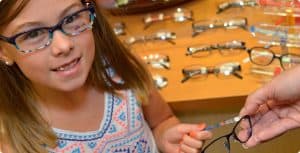Did you know that almost 100% of blue light rays, compared to fewer than 1% of UV rays, reach the retina?
In today’s digital age, optometrists around the world are increasingly being asked, ‘Are blue light glasses worth it?’
While there is some debate over the impact of blue light on eye health, there is enough scientific information to provide a reliable answer.
What is blue light?
On the visible spectrum, blue light is a high-energy, short-wavelength light. Blue light is emitted mostly by the sun, but it is also emitted by interior light sources and digital devices.
Blue light stimulates alertness, so it can disrupt sleep patterns.
That’s problematic, given how many people look at digital devices throughout the day and even into the night.
Few studies have found that blue light generated by smartphones and other digital devices causes long-term or irreparable eye damage.
Is blue light harmful to our eyes?
Since blue light has a higher frequency and energy than other colors of light, it can more easily penetrate the structures of our eyes and reach the retina, the light-sensitive nerve layer at the back of the eye.
One study published in Integrative Biology (2017) found that blue light negatively affects human retinal cells and increases oxidative damage, and the frequencies of the blue light is similar to those emitted by digital screens.
It’s worth noting that the researchers used retinal cells in a petri dish, as opposed to actual human eyes. Human eyes contain natural protective elements that filter out a certain amount of UV and blue light rays.
According to other studies, blue light exposure has also been associated with poor sleep quality, particularly when using a digital device late at night.
Long-term exposure to blue light has been shown to result in digital eye strain, eye fatigue, and dry eye syndrome.
To counteract the negative effects of blue light overexposure, blue light lens filters and glasses are now available from most optometrists.
Contact an eye doctor near you to find out more about blue light glasses.
SEE RELATED: Does Blue Light affect Children?
Studies on blue light
Despite the fact that scientists have yet to determine if blue-blocking glasses improve ocular health, they do have other advantages.
According to a study published in the Journal Of Adolescent Health (2015), teenagers who wore blue-blocking glasses in the nighttime hours had better circadian rhythms than those who didn’t wear blue-blocking glasses. The sleep-wake cycle is regulated by circadian rhythms.
According to another study published in the Asia-Pacific Journal of Ophthalmology (2015), blue-blocking glasses or lenses may be useful in reducing eye fatigue.
A study published in the Journal of Medical Imaging (2019), found that radiology residents who wore blue light filtering glasses had considerably less computer vision syndrome symptoms, or digital eye strain.
Should students use blue light lenses?
Yes! Children and teenagers who use digital screens for academics and leisure activities on a daily basis may be unaware that they are suffering from eye fatigue or strain.
Blue light glasses could be the answer to their headaches, blurred vision, and improved circadian rhythms.
LEARN MORE: Guide to Children’s Eye Exams
Schedule an eye exam with an eye doctor near you to learn more about the benefits of blue light glasses.
If computer use is a major part of your day, blue-blocking glasses may improve sleep quality and reduce symptoms of computer vision syndrome and eye fatigue.


